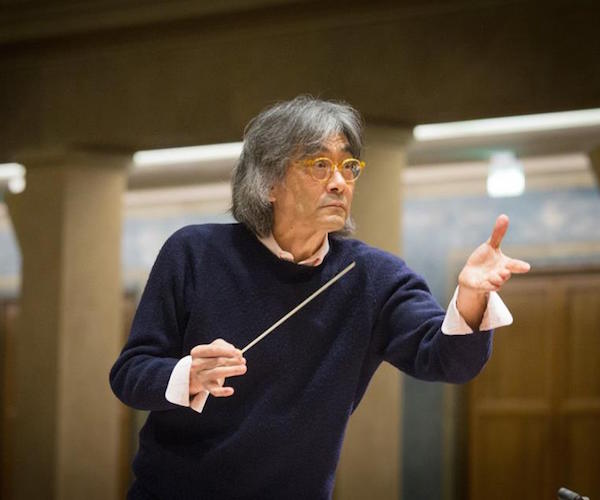Concert Review: Kent Nagano’s Orchestre Symphonique de Montreal Triumphs in Boston
Conductor Kent Nagano’s return to Boston revealed him to be a fully mature world-class conductor with the requisite charisma and authority over the 100-plus Montreal players.

Kent Nagano conducting the Symphonieorchester des Bayerischen Rundfunks.
By Michael Johnson
Kent Nagano made a rousing return to Boston Wednesday evening with his Orchestre Symphonique de Montreal, conducting here for the first time in many years before a wildly enthusiastic Symphony Hall audience. Amid the seven curtain calls and two full-orchestra encores, he stopped to pay homage to Montreal, where he has served as music director for ten years, and addressed the audience in French:
“Merci beaucoup.”
Nagano spent his formative years in Boston as assistant to the late Sarah Caldwell in opera production, then later worked as assistant conductor under Seiji Ozawa and the Boston Symphony Orchestra. His return to Boston revealed him to be a fully mature world-class conductor with the requisite charisma and authority over the 100-plus Montreal players. His podium demeanor is lean and mean.
Boston was the third stop on a ten-city U.S. tour, the most ambitious trip the orchestra has made to America in 25 years.
The orchestra played a relatively safe program of Debussy, Prokofiev, and Stravinsky, but there was nothing routine about the sparkling, edgy performance, which generated a rousing response from the audience.
Following the concert I found Nagano backstage and asked him how the felt about the tumultuous reception from Bostonians. “We got this tremendous energy from the audience,” he said in disbelief, “and that in turn energized the players.” I questioned him on the near-surgical precision of his musicians, one quality that sets the Montreal orchestra apart. “Detail,” he said. “It’s all about detail. We analyze every note, every phrase and we put it all together.”
The program was intelligently set up to provide a steady crescendo throughout the more than two hours of music. Nagano eased into the evening with Debussy’s Prelude a l’apres-midi d’un faune, a ten-minute exercise in sensual, sumptuous orchestration that showed off the players’ mastery of tone and color.
Polite applause greeted the quiet climax of the Debussy, and stage hands then rolled out the Steinway for Prokoviev’s Piano Concerto No. 3 in C-major Op.26. Russian pianist Danill Trifonov, first-prize laureate of the Tchaikovsky and Rubenstein piano competitions in 2011, made his entry with a stiff bow.
The concerto is perhaps the most melodic, the most exciting and the arguably most demanding of Prokofiev’s five works in the genre. Trifonov is already an artist of surpassing quality with emphasis on Chopin and Rachmaninov, and judging by this performance Prokofiev may be his next focus. He displayed total involvement in the music, and seemed thoroughly at home with Nagano and his blistering pace. Already known for eccentric body language, Trifonov gave Boston the full range of hair-flicks, bench-bouncing, and body spasms.I was reminded of the late Charles Rosen’s description of pianists’ physicality. ”The heartbeat quickens and the body tenses during passages of raging fury: the body imitates the music.”
Trifonov brought the audience along with him, eliciting spontaneous applause between movements and producing a roar of approval and a standing ovation at the end. He obliged with multiple curtain calls and a light encore.
Following the intermission, Nagano delivered the evening’s greatest treat, Stravinsky’s Rite of Spring. Conducting from memory, he turned the once-scandalous – now standard – Stravinsky masterpiece into a kaleidoscope of powerfully punctuated segments and dissonant harmonies. Complex rhythms of the pah-oom variety posed no problem for the confident Montreal players. During the curtain calls Nagano singled out the percussion section, which had hammered the Stravinsky score with such verve.
Nagano offered two additional orchestral encores, a delightful rarity at this level of performance.
Michael Johnson is a Franco-American music writer and failed pianist. He has contributed articles on music to International Piano, the International New York Times, The Washington Times, Clavier Companion, ClassicalScene.com, and Facts & Arts.com. He divides his time between Brookline and Bordeaux.
Tagged: Danill Trifonov, Kent Nagano, Michael Johnson, Orchestre Symphonique de Montréal
